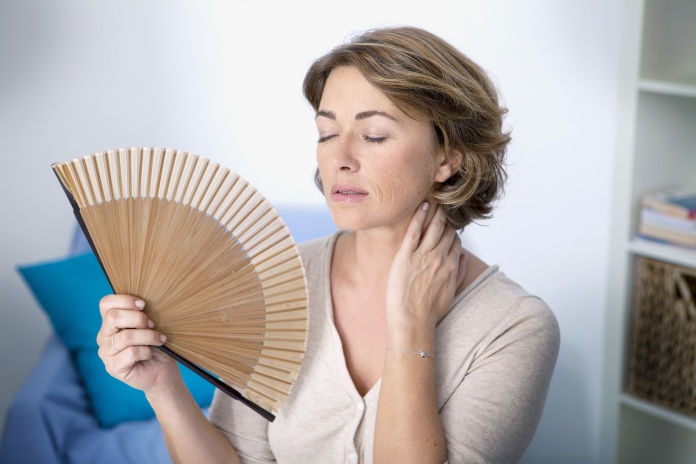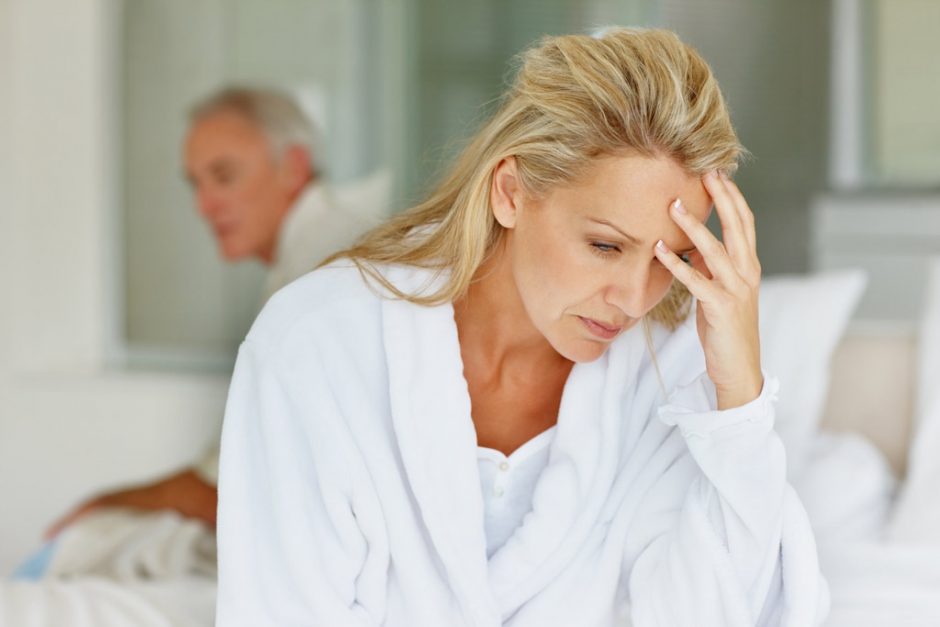
Here’s what you must know about menopause
Are you female, experiencing hot flashes, drastic mood changes or an unexplained gain in weight? It could be because of menopause.
Despite the classic signs and symptoms of menopause, it can sometimes be difficult to identify it and rule out any medical condition that might cause the menstrual cycle to fluctuate. Therefore, to understand menopause fully, we need to learn what it is and why it happens in the first place.
Menopause is a naturally occurring stage in a woman’s life (usually around 45-55 years) when the menstrual cycle ceases and the woman is no longer able to reproduce. Clinically, it is diagnosed after a 12-month cessation period of normal menstruation.
Also known as climacteric, menopause is a result of hormonal changes in the body. The production of female hormones is closely associated with the eggs formed in ovaries. On average, a woman is born with around 1 million eggs. However, only 300,000 remain at puberty and this number keeps decreasing with age. At around 45 years, women usually begin ovulating less frequently owing to the low numbers of eggs in their ovaries.
Several hormones that are produced by these eggs encounter similar fates during the menopausal period – a drop in their levels. The two most important hormones that are involved in regulating the menstrual cycle include estrogen and progesterone. A third hormone testosterone, which is largely believed to be a male hormone, also has its effects on the menstrual cycle.
The decreased numbers of both the eggs and the levels of the hormones results in the discontinuation of menstruation and an inability to bear children. In simple words, it is the stage when the woman’s body loses its reproductive capabilities and is no longer fertile.
Signs and Symptoms of Menopause
Menopause manifests itself in both physical and emotional forms. Some of the most important symptoms are hot flashes, mood changes and vaginal dryness. It’s important to remember that not all women experience the same symptoms. In fact, according to studies, 20% are asymptomatic.
The severity of the symptoms greatly varies person to person but in any case, menopause is a normal occurrence and should not be treated as a medical condition. Treatment to relieve the symptoms is, however, recommended. We will discuss the treatment options later in this article but for now, let’s look into the symptoms of menopause in more detail.
- Hot Flashes: Hot flashes or hot flushes are a sudden sensation of warmth and heat creeping up the body predominantly towards the head and neck regions. Hot flashes are usually accompanied by night sweats, both of which are probably caused by low estrogen levels in the brain. A low level of this hormone is hypothesized to affect the regions of the brain that control the homeostasis of the body and normal body temperature. Around 75% of women experience hot flashes during menopause.
- Changes in the Mood: As with premenstrual syndrome, women undergoing menopause are likely to suffer from mood swings. Depressed mood during the perimenopausal (more later) period is more common. The low moods are attributed to the decreased levels of both estrogen and progesterone in the brain.
- Vaginal Dryness: A third important symptom of menopause is vaginal dryness. Normally, estrogen is responsible to lubricate the vaginal cavity and to keep it favorable for intercourse. As the levels of this hormone fall in menopause, the vagina becomes dry which may cause discomfort and pain during sexual intercourse. A dry vaginal cavity is also more vulnerable to infections.
Other symptoms of menopause include insomnia, weight gain, sore breasts, migraines, anxiety, and a low libido which will be looked into more detail later.
Stages of Menopause
Menopause is not a sudden occurrence; it’s actually a gradual process that takes over years. Menopause can be broadly subcategorized into three stages: perimenopause, menopause and postmenopause.
Perimenopause is the time period before the last menstrual cycle (that is, before menopause). It can stretch over five to six years and is characterized by irregular periods. Despite the fact that the eggs are depleting, hormonal imbalances during perimenopause can sometimes cause increased ovulation. The average duration of a 28-day cycle may be reduced and ovulation may occur twice in one cycle.
The signs and symptoms of perimenopause correlate with that of actual menopause. Hot flashes, mood swings, insomnia, weight gain, bloating and headaches are common symptoms that are diagnostic of the perimenopausal period. Irregular bleeding in between periods and a reduced duration of the average menstrual cycle are important signs to look out for when diagnosing perimenopause.
Postmenopause occurs after menopause and is defined as the time 12 months after the last period. Postmenopausal symptoms are similar to menopause as well; however, the severity of them slowly subsides.

Am I in Menopause?
As mentioned before, diagnosing menopause can sometimes be tricky especially in a woman who is suffering from the symptoms earlier than expected (premature menopause). There are a couple of lab tests available to help with the diagnosis; however, the gold standard to identifying the menopausal period is through the signs and symptoms.
Blood tests can be performed by your doctor to find out the levels of FSH (follicle stimulating hormone) produced by the pituitary gland. High levels of FSH are usually seen during the menopausal period but it isn’t always necessary. Low levels of estradiol (a form of estrogen) can also be detected to reach a diagnosis.
Alternatively, if the levels of TSH (thyroid stimulating hormone) are found to be increased in a blood test, the symptoms you’re facing could very well be due to an underactive thyroid or hypothyroidism.
What Should I Expect in Menopause?
Most women undergo a change in their lifestyle owing to the effects of the symptoms of menopause. If you’re a woman who’s going through menopause then there are a couple of things you should expect to happen. Once the changes are acknowledged, they can be managed successfully.
- Weight Gain: Many women often find themselves either gaining weight or not losing enough quickly during menopause. Low estrogen levels promote fat storage as well as water retention during menopause and women tend to suffer from bloating and edema. An increase in abdominal fat is usually seen.
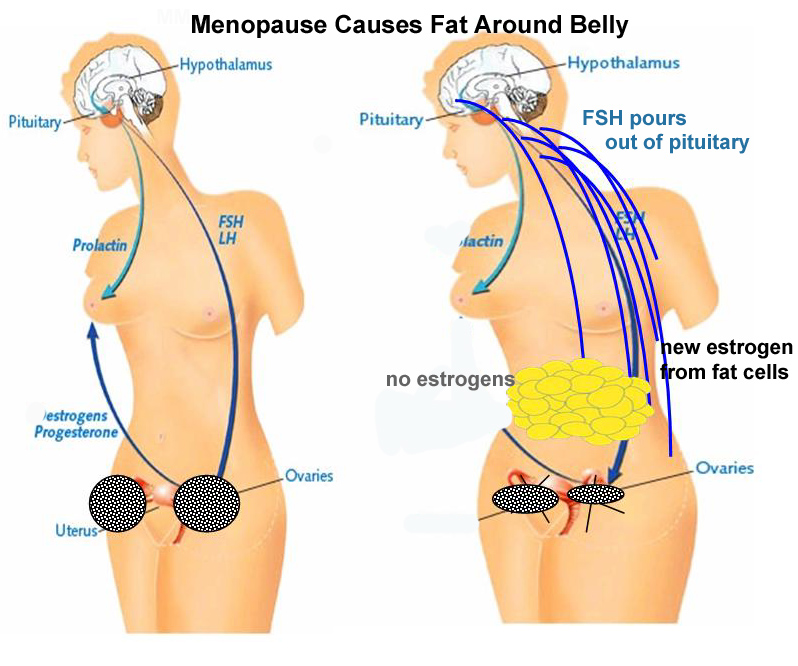
- Insomnia: Hormonal imbalance and night sears may sometimes cause fluctuations in the normal sleep-wake cycle of some women. The anxiety associated with menopause also contributes in increased wakefulness.
Read more: Here is why sleeping may lead to wrinkles over time
- Sagging Skin and Wrinkles: Low levels of estrogen inhibit the production of collagen – an important protein to keep your skin tight and elastic. Lack of collages in menopause makes the skin sagging and encourages wrinkles to form. Dryness and increased facial hair especially under the chin are also sometimes met in women undergoing this phase.
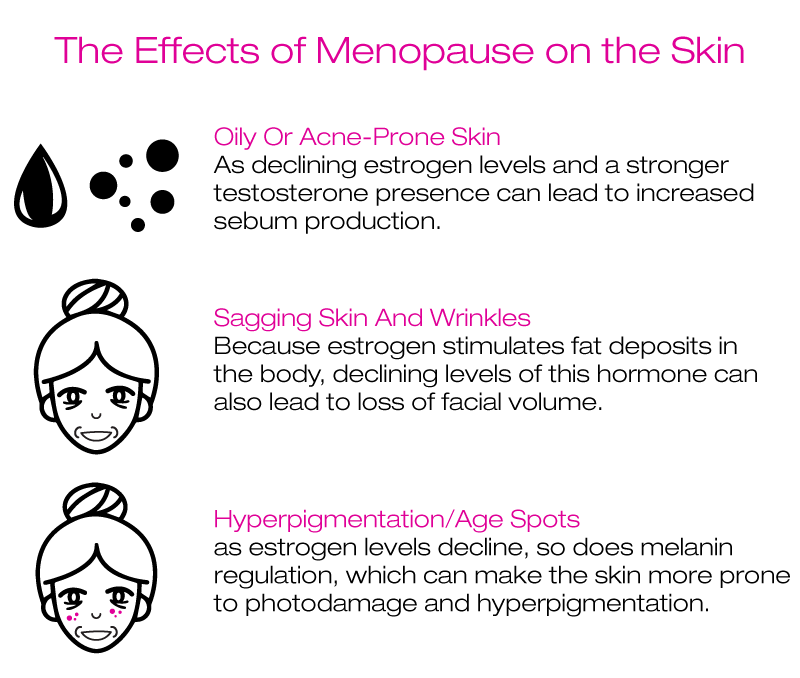
- Increased risk of Heart Diseases: Estrogen is an important hormone that maintains the proper functionality of the heart and its blood vessels. A drop in estrogen levels causes an increased chance of contracting a cardiovascular disease
- Osteoporosis:Another common disease that menopausal women face is osteoporosis which is when the bones become brittle and weak. Normal levels of estrogen are required to promote osteogenesis (bone formation). A fall in the levels of this hormone causes bones to become weaker and more susceptible to trauma or fracture.
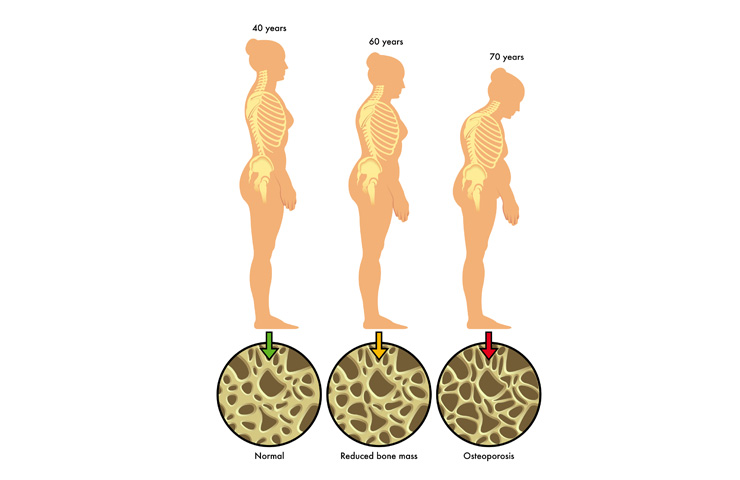
- Bladder incontinence: Frequent urination or even dribbling might be seen in some women. This is due to the lack of elasticity of the tissues of the pelvic floor after menopause.
- Sexual Function and Libido: Vaginal dryness because of the lack of estrogen and progesterone levels results in painful sexual intercourse or even bleeding. The hormonal balance also results in a loss of sexual desire or libido in menopausal women.
Read more: Here’s what to do when you have low sex drive
- Effect on Mental Health: Depression, anxiety and radical mood changes are common symptoms of menopause. Some women also experience a low self-esteem and body image. Women who used to suffer from low moods during PMS throughout their lives are more likely to suffer from depression during perimenopause and menopause as well.
- Effect on Fertility:One of the most life-changing symptoms of menopause is women losing the ability to bear children or reproduce. The two female hormones – estrogen and progesterone – that see a drop in their levels in menopause are crucial in pregnancy.
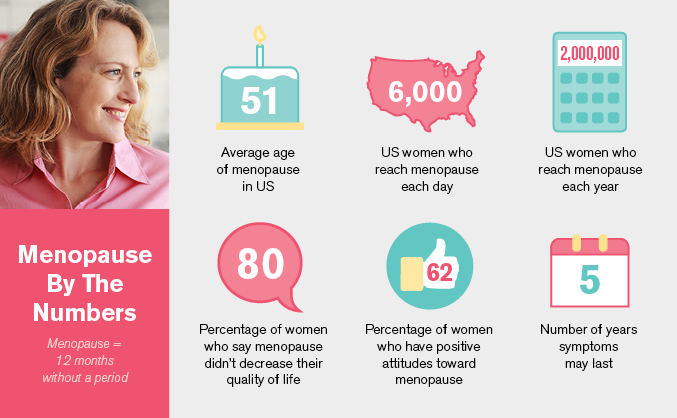
Treating Menopause Symptoms
Menopause is a natural phenomenon that every woman has to endure; however, for some it can be more distressing than for others. The traditional treatment therapy employed in most clinics is the Hormone Replacement Therapy (HRT).
Hormone Replacement Therapy consists of different pills, patches, tablets, creams or gels that use the three main hormones whose levels are affected during menopause – estrogen, progesterone and sometimes, testosterone. HRT aims to restore the normal levels of these hormones in the body to counteract the signs and symptoms of menopause. Although it helps balance these hormones, HRT does not treat menopause itself since menopause is an inevitable stage in a woman’s life.
Estrogen and progesterone therapy usually provides relief from most of the symptoms of menopause; low doses of testosterone may be required to improve mood, libido and sexual function.
There are, however, a few risks to HRT as well: long-term use of synthetic estrogens has been linked with an increased risk of breast cancer and cardiovascular diseases, whereas a high dose of testosterone may promote excessive facial growth (hirsutism), baldness, acne, oily skin and a high temper. General side effects of HRT include bloating, nausea, vomiting, edema and tender breasts.
Despite the consequences of Hormone Replacement Therapy, it is still the most popular clinical treatment option. Nevertheless, we recommend talking about the benefits and risks with your doctor first.
Read more: Why women all over the world are looking for this supplement
Self-Help and Management
There are times when HRT is not favorable or you might want to stick to more conventional methods to combat your symptoms. Self-help for menopause is successful to a great extent if employed properly and may help you cope with lifestyle changes. Here are some ways you can manage your symptoms yourself:
1) Menopause and Hot Flashes
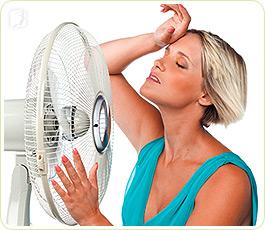
Hot flashes are usually managed through making a few environmental and dietary changes. Keeping yourself well aerated or staying in an air conditioned room can help decrease the incidence of hot flashes. Regularly taking cold showers and changing clothes can also help to keep the body cool.
As far as dietary changes are concerned, many experts recommend taking food that contains the compound, phytoestrogen. Phytoestrogen rich-food includes soy beans, legumes and whole grains. Alternatively caffeine, alcohol and spicy foods are advised to not be taken during menopause.
A third way to combat hot flashes is through a breathing technique. Breathe deeply through your nose by contracting the muscles of your abdomen. Inhale and exhale for about five seconds each and repeat this exercise at least twice a day.
Finally, anti-depressants such as paroxetine are also sometimes prescribed to women experiencing intense hot flashes.
2) Menopause and Sleep Disturbances
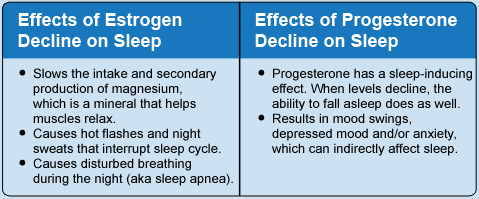
One of the main reasons of a disturbed sleeping pattern in a menopausal woman is due to night sweats and hot flashes. Keeping the bedroom cool and well aerated are essential for a good night’s sleep. Similarly, wearing loose clothing is also recommended.
Exercising regularly, avoiding caffeine and using prescription sleeping pills can also help fighting off the menopausal insomnia.
3) Menopause and Low Moods
Seeking a therapist to help you through this phase is always a good idea. If you’re not comfortable in discussing your thoughts with a professional, talking to a friend or a family member can help alleviate the mood. Keeping yourself busy with work or any other activity can also take your mind off things. A healthy lifestyle (healthy diet and exercising regularly) can also boost low moods significantly.
If you’re someone who enjoys new things, why not try some yoga or travel more? Remember – you’re not alone. An estimated 80% of women in menopause experience similar symptoms.
4) Menopause and Vaginal Discomfort
Vaginal dryness causes pain during sex; to combat the discomfort, vaginal lubricants and moisturizers are applied in the vagina. Alternatively, vaginal estrogen can also be applied directly to promote lubrication.
Sometimes, menopause also affects a woman’s libido. A recently FDA-approved drug, Addyi is used specially to improve the sexual drive in pre-menopausal women.

5) Menopause and Urinary Incontinence
Kegel exercises to strengthen the pelvic floor muscles are recommended for women that are in their late 40’s. Kegel exercises include holding in the urine and letting go after short intervals. These are the same exercises that are also advised in pregnant women to ease the pain of labor.
6) Menopause and Weight Gain
It’s no secret that a woman in menopause is more likely to gain weight. Not only does gaining weight (predominantly abdominal fat) become easy, but burning calories becomes more difficult as well. Eating less than you normally would before menopause can help keep the weight gain at bay. Increasing your exercise sessions and routines can also benefit in managing the weight.
Postmenopausal Effects
Twelve months after the final period is defined as the postmenopausal stage. Although the symptoms of menopause continue into this stage, they gradually subside as other changes start taking place.
Women who’ve had their menopause are more prone to contracting certain diseases such as osteoporosis, breast cancer and cardiovascular disease. While some of these are natural responses to low hormone levels, others might be red flags.
Regular bone density checking and multivitamin supplements are beneficial to women who’ve had their menopause. Tuning the diet and adding more calcium and protein such as fish and, dairy, green leafy vegetables and meat can help prevent osteoporosis from developing.
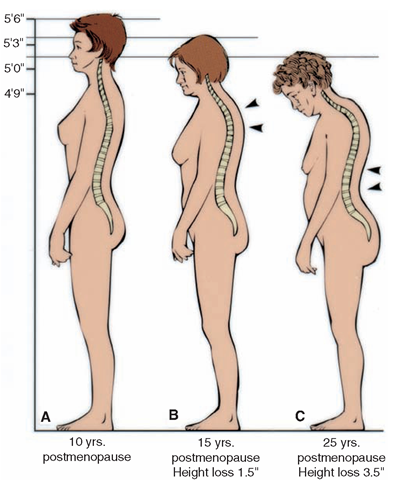
Similarly, adopting a nutritious diet, regular exercises and refraining from smoking can improve the condition of your heart and prevent the chances of a heart disease.
Diabetes type II is another disease that correlates with the low levels of estrogens as seen after menopause. As with any patient of diabetes, controlling the diet (decreasing sugar intake) and increasing exercise is the top recommended strategy. Frequently getting your blood sugar tested can also give you a clue about how your body is handling your glucose.
Other effects seen in postmenopause may be less normal: if you notice a lump or a change in texture in your breasts or nipples or if you bleed from the vagina after menopause, contact your doctor immediately.
Premature Menopause
An early onset of menopause, or premature menopause, before 40 years of age is an uncommon occurrence and could be due to a number of underlying factors.
In cases when periods halt suddenly (primary ovarian insufficiency), premature menopause may occur. Although primary ovarian insufficiency (POI) and premature menopause are interlinked, they’re not the same thing. Sometimes, normal menstrual cycle can resume after a temporary pause in POI.
Secondary causes of an early menopause include smoking, surgical removal of the ovaries or the uterus and chemotherapy.
Some women are more predisposed to a premature menopausal period because of their genetic makeup. Other factors that may influence it include autoimmune disorders (such as hypothyroidism, Crohn’s disease, Type 1 Diabetes and chronic candidiasis), enzyme deficiencies, and infections such as mumps.
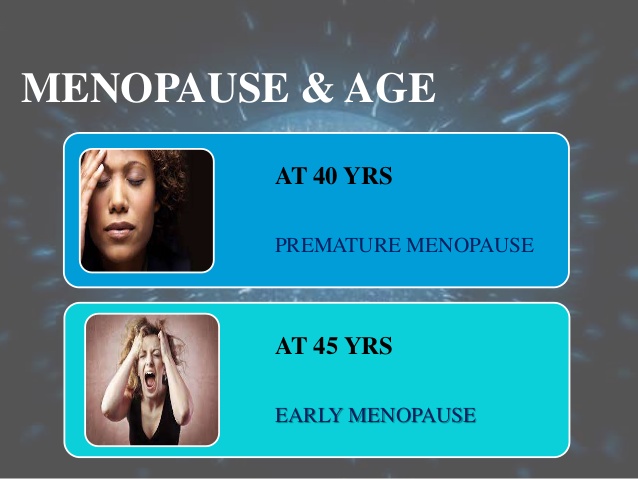
When menopause occurs well before the expected age, it can have some dire effects on the lifestyle and wellbeing of the woman. Experiencing the menopausal symptoms at a young age is not only distressing but difficult to cope with as well. Therefore, managing and treating the signs of premature menopause is important.
As with menopausal treatment, Hormone Replacement Therapy is usually recommended in such women. Changes in the diet, exercise and an overall lifestyle are also helpful management strategies.
Menopause – Myths
Have you ever had someone tell you that menopause will completely unable you to make love to your lover? Or that you’ll pack a dozen pounds come menopause? The internet is unfortunately swamped with unnecessary information which isn’t always authentic or accurate. Here are the top 5 common myths about menopause and the actual reality behind them:
Myth #1: Menopause will mean the end of my sexual life
Not true, ladies. Sure, the hormonal imbalances cause vaginal dryness and some women do suffer from a low sexual drive but that doesn’t incapacitate you from ever having sex again. Vaginal estrogens and lubricants can help relieve the discomfort felt during intercourse, and FDA-approved ‘female Viagra’ can restore the sexual drive.
Moreover, vaginal dryness and a low libido are general symptoms of menopause and do not necessarily affect every woman. In fact, an estimated 50% menopausal women suffer from vaginal dryness.
Myth #2: My periods will stop one day spontaneously
A common misconception about menopause is that it occurs suddenly at any given time. That’s not how it works though. Your body begins experiencing the signs of menopause well before the final period. Irregular menstrual cycles and over ovulation are classic signs that menopause will occur in a few years.
Myth #3: I’ll gain tons of weight and get fat
Menopause is usually accompanied by a drop in the basal metabolic rate and an overall increase in the BMI or the weight. However, it doesn’t have to happen this way. With regular exercise and a healthy diet, you might never gain an extra pound at all.
Myth #4: My female hormones are as good as gone after menopause
While it’s true that female hormones, estrogens and progesterone, suffer an inevitable fall in their levels, it doesn’t mean the hormone production in your body completely ends after menopause. These hormones are constantly being produced by the adrenal glands, although in smaller amounts.
Myth # 5: Hormone Replacement Therapy is the only useful treatment option
Hormone Replacement Therapy is a good option to battle the symptoms of menopause, however it isn’t the only option and sometimes it might not even be the best one. Managing your symptoms and making changes in your lifestyle by adopting a healthy diet and schedule can sometimes prove to be more beneficial in treating the symptoms of menopause than HRT.
You’ll Get Through This
Breathe easy; it’s natural, it’s normal and it’s nothing to dread. Just because you’ve had your menopause doesn’t mean you can’t enjoy the same youthful life you’ve always been living. With a little patience and some self-help against the symptoms, you can survive this phase like every strong woman does.

